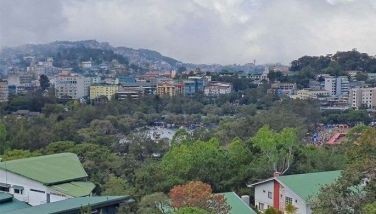SC tells Calida: Thousands of deaths in drug war of 'grave' public concern

MANILA, Philippines — The thousands of deaths in the government’s “war on drugs” are a matter of “grave public concern,” the Supreme Court told Solicitor General Jose Calida as the country’s highest court moves forward in the petition against the Duterte administration's "Oplan Tokhang."
In a resolution ordering the Office of the Solicitor General to release the police reports, the SC stressed: “The undeniable fact that thousands of ordinary citizens have been killed, and continue to be killed, during police drug operations certainly is a matter of grave public concern.”
The SC stressed: Article III, Section 7 states that “[t]he right of the people to information on matters of public concern shall be recognized. Access to official records, and to documents, and papers pertaining to official acts, transactions, or decisions shall be afforded the citizen.”
The SC ordered the government to release the voluminous records to the two groups of petitioners in an en banc session last April 3, but a copy of the resolution was made public only Wednesday.
The drug war petition
In 2017, two groups of petitioners asked the SC to halt the implementation of Duterte’s war on drugs. Their pleas are centered on killings in the San Andres Bukid district of Manila and in Baguio.
Towards the end of the oral arguments, Senior Associate Justice Antonio Carpio ordered Calida to submit all documents pertaining to investigations into police anti-drug operations from July 1, 2016 to Nov. 30, 2017.
While Calida initially agreed to Carpio’s order, the government’s chief lawyer had repeatedly appealed for the reversal of the order, citing national security.
Determination of documents’ relevance up to court
In its latest resolution, the SC also reminded Calida that it has already been settled that the determination of the relevance of evidence “rests largely at the discretion of this Court,” noting once again that the OSG has "arrogated upon itself" the determination of the documents’ relevance to the resolution of the petition.
In complying with the court’s earlier order, the OSG classified the drug war documents into two categories: Category 1 which includes the list of persons and operations from July 1, 2016 to Nov. 30, 2017, and Category 2 for information on cases cited in the two petitions.
OSG sent the documents classified as Category 2 to the petitioners.
READ: Calida: Petitioners not entitled to drug war documents
But the SC also pointed out that the OSG did not make any mention of categories of the documents during the oral arguments nor when it first appealed the order in Dec. 18, 2017, “when it refused to submit all the information and documents requested by Members of this Court.”
“We find that it cannot now impose conditions on its compliance,” the SC said.
“We find that it is only the OSG, which unilaterally classified the documents into Categories 1 and 2, without the knowledge or consent from this Court and the parties, for the first time on 4 September 2018, or after it already submitted its Compliances to the Court and the parties without any qualification or condition on 26 April 2018 and 25 June 2018,” the SC added.
The court held: “It is simply ridiculous to claim that these information and documents on police operations against drug pushers and users involve national security matters.”
The April 3 order reiterates the tribunal’s Feb. 3, 2018 order when it ruled on the OSG’s motion for reconsideration on the order to yield the police operation records.
In a strongly worded resolution, the SC en banc then said: “The OSG’s continued refusal to submit to this Court’s requirement will lead this Court to presume that these information and documents, because they are wilfully suppressed, will be adverse to the OSG’s case.”
- Latest
- Trending
































